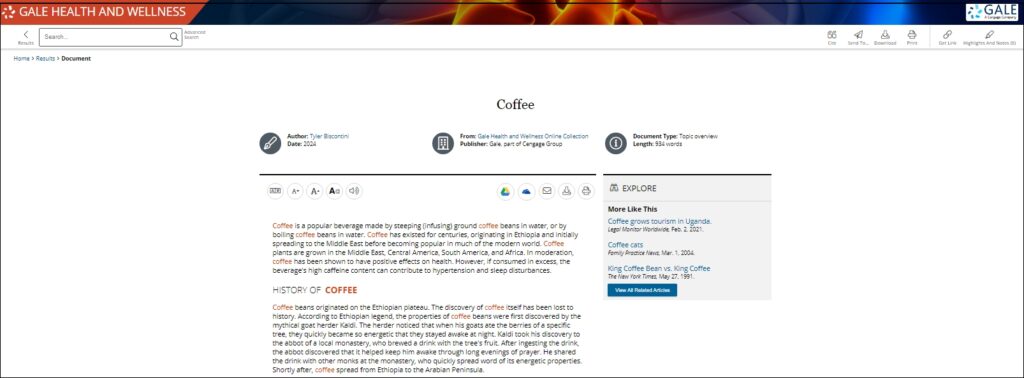| By Brenda Wilmoth Lerner, RN |
While I’m enjoying a cup of tea, I thought I’d attempt to untangle and clarify the overload of recent information about the potential health benefits and risks of daily coffee consumption. As part of our ongoing effort in the Gale Health and Wellness database to include everyday health topics and practices, the universal appeal of coffee makes it a must-have inclusion.
Coffee has made a remarkable turnaround from a few decades ago, when the World Health Organization classified it as a possible carcinogen, and Americans responded by cutting their coffee consumption in the mid-1990s to half of what it was at its peak in 1946. Today, coffee is back, and media reports tout health benefits from your morning cuppa, ranging from improvements in short-term memory, improved irritable bowel syndrome symptoms, reduced heart disease, and even increased longevity.
Interestingly, per capita coffee consumption in the U.S. has yet to match the peak 1946 levels, even with the appearance of Starbucks and other specialty coffee shops that reside seemingly on every commercial corner. This is likely due to the abundance of sodas and other alternatives. Last year, however, the National Coffee Association estimated that about 73% of American adults who drank beverages other than water regularly opted for coffee. And most of these people had more than one cup per day. But are these benefits to health real, and if so, how much coffee is enough to capture them? How much is too much? We’ll take these questions one by one and see where the evidence stands.
Multiple studies have shown that regular coffee consumption of between two and five cups per day correlates with living longer. Researchers in Britain linked a longer lifespan to adults who drank two cups of any type of coffee per day compared to those who consistently avoided coffee. The 2022 observational study relied on questionnaires from 450,000 adults (median age 53.8 years) who were followed for an average of 12.5 years. Another seven-year European study reported in 2022 that all-cause mortality during the study period was 30% less among 171,000 participants who drank 1.5 to 3.5 cups of coffee per day than participants who did not drink coffee. Similar results were noted by researchers in Spain among study participants there who drank four cups of coffee each day. And in Singapore, coffee drinkers in a 20-year longitudinal study were found to maintain greater muscle strength and agility as they entered their mid-70s compared to non-coffee drinkers, setting the stage for fewer falls, more activity, and a longer lifespan.

Some of these studies specifically addressed the potential role of coffee in delaying or preventing stroke and heart attack, and the results show promise. In the 2022 British study, for example, two to three daily cups of any type of coffee, decaffeinated, ground, or instant, was associated with an average 10% reduction in arrhythmias and incident cardiovascular disease compared to those who didn’t drink coffee. This points to benefits from coffee in addition to those already known to come from caffeine consumption; coffee contains over 100 active components, including many antioxidants.
It’s likely that the caffeine in coffee aids both short-term and long-term memory retention. Researchers at Johns Hopkins University found that giving 200 mg of caffeine (about the same amount contained in two cups of coffee) after memory exercises improved recall for up to 24 hours. Coffee consumed before memory tasks also results in increased alertness and short-term recall.
The picture is cloudier when it comes to the potential benefits of coffee consumption and irritable bowel syndrome (IBS). Multiple recent studies show conflicting results. One very large study conducted in Singapore found that coffee drinkers were 9–19 percent less likely to develop IBS than the general population. Those who drank ground coffee as opposed to instant coffee received more benefit, as did those who drank more coffee. In another recent large meta-analysis, however, three of the eight studies involved found that coffee consumption promoted IBS in some people with coffee sensitivities.
It’s commonly known that too much coffee can upset digestion, but how much is too much? In most recent studies, the benefits from coffee were realized after 1.5 to 4 cups per day. More than that was often accompanied by stomach upset, disrupted sleep, and feeling jittery rather than alert. Even robust coffee drinkers should stop at five cups per day, according to researchers in Australia. A six-cup per day habit (with approximately 95 mg caffeine per cup) appears to be the tipping point where benefits stop and cardiovascular risk actually increases.
Although it’s important to note that these studies rely on correlation (none showed direct cause and effect with certainty) and don’t pinpoint the exact mechanism in coffee that conveys these advantages, the evidence for overall benefits from moderate coffee consumption is mounting, and is gaining attention among researchers to try to elucidate just what it is in coffee that’s conferring benefits. So far, the potential benefits of coffee for maintaining health seem promising enough that it’s tempting to forgo my beloved orange pekoe tea tomorrow morning and substitute it for at least 1.5 cups of coffee instead.


